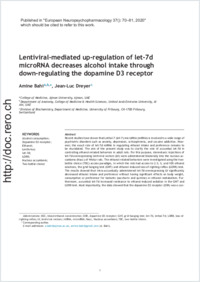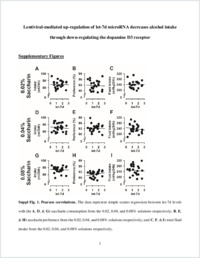Lentiviral-mediated up-regulation of let-7d microRNA decreases alcohol intake through down-regulating the dopamine D3 receptor
- Bahi, Amine College of Medicine, Ajman University, Ajman, UAE - Department of Anatomy, College of Medicine & Health Sciences, United Arab Emirates University, Al Ain, UAE
- Dreyer, Jean-Luc Division of Biochemistry, Department of Medicine, University of Fribourg, CH-1700 Fribourg, Switzerland
-
01.08.2020
Published in:
- European Neuropsychopharmacology. - 2020, vol. 37, p. 70–81
English
Recent studies have shown that Lethal-7 (let-7) microRNA (miRNA) is involved in a wide range of psychiatric disorders such as anxiety, depression, schizophrenia, and cocaine addiction. However, the exact role of let-7d miRNA in regulating ethanol intake and preference remains to be elucidated. The aim of the present study was to clarify the role of accumbal let-7d in controlling ethanol-related behaviors in adult rats. For this purpose, stereotaxic injections of let-7d-overexpressing lentiviral vectors (LV) were administered bilaterally into the nucleus accumbens (Nacc) of Wistar rats. The ethanol-related behaviors were investigated using the two-bottle choice (TBC) access paradigm, in which the rats had access to 2.5, 5, and 10% ethanol solutions, the grid hanging test (GHT) and ethanol-induced loss-of-righting-reflex (LORR) test. The results showed that intra-accumbally administered let-7d-overexpressing LV significantly decreased ethanol intake and preference without having significant effects on body weight, consumption or preference for tastants (saccharin and quinine) or ethanol metabolism. Furthermore, accumbal let-7d increased resistance to ethanol-induced sedation in the GHT and LORR test. Most importantly, the data showed that the dopamine D3 receptor (D3R) was a candidate target of let-7d In fact, and using real time PCR, let-7d was found to directly target D3R mRNA to decrease its expression. Further analyses proved that D3R expression was negatively correlated with the levels of let-7d and ethanol-related behaviors parameters. Taken together, the data indicating that let-7d impaired ethanol-related behaviors by targeting D3R will open up new exciting possibilities and might provide potential therapeutic evidence for alcoholism.
- Faculty
- Faculté des sciences et de médecine
- Department
- Département de Médecine
- Language
-
- English
- Classification
- Biological sciences
- License
-
License undefined
- Identifiers
-
- RERO DOC 328895
- DOI 10.1016/j.euroneuro.2020.06.011
- Persistent URL
- https://folia.unifr.ch/unifr/documents/308914
Other files
Statistics
Document views: 100
File downloads:
- pdf: 214
- Supplementary material: 91

